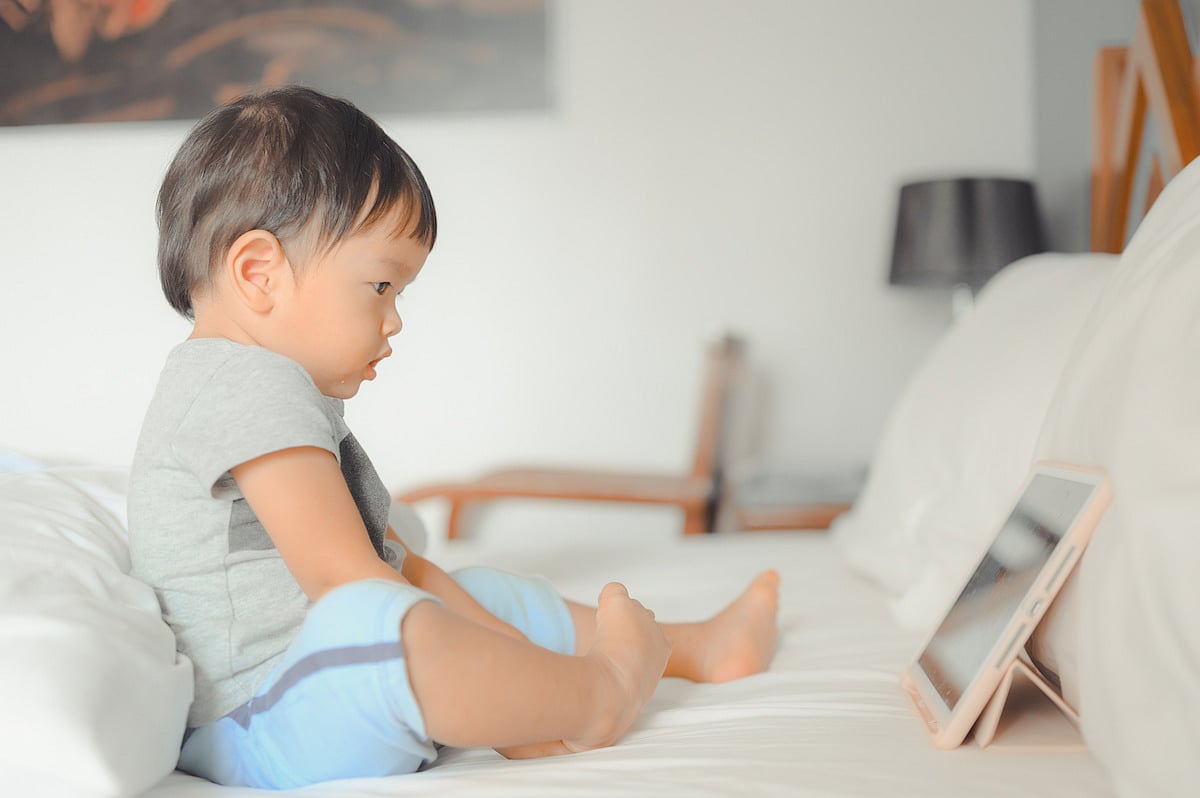Manténgase sano!

- Ernie Mundell
- Posted August 12, 2024
More Toddler Screen Time Brings More Tantrums, Study Finds
Using tablets as 'e-babysitters' for toddlers could lead to more tantrums, which in turn can have harried parents trying to calm a child by handing them a tablet, new research shows.
This type of "vicious cycle" played out during the early years of many of the Canadian youngsters tracked in the study.
The bottom line, according to the researchers: "Tablet use in early childhood can disrupt the ability to manage anger and frustration and lead to increased outbursts in young children."
The research was led by Caroline Fitzpatrick, a professor of education at the University of Sherbrooke in Sherbrooke, Quebec. It was published Aug. 12 in the journal JAMA Pediatrics.
As Fitzpatrick's team noted, the preschool years are "a sensitive period for the development of emotional regulation skills."
Babies are often prone to crying and screaming. But as years go by they become toddlers and then young children who are (it is hoped) much better at controlling expressions of anger and frustration.
However, they need parental attention to do so. According to the researchers, toddlers learn to regulate emotions in two ways. First, parents can directly coach kids to help control emotional outbursts as they arise; and secondly, kids watch parents closely to learn how adults deal with their own emotions.
Increasingly, however, toddlers are interacting with screens rather than mom or dad, Fitzpatrick's team said.
They noted that, "according to a U.S. survey, most 4-year-olds own their own mobile device," and -- no doubt helped by the pandemic -- the amount of time a young child spends staring at these devices rose from an average of 5 minutes per day in 2020 to 55 minutes per day in 2022.
A prior study conducted by the same team found toddlers' outbursts rose along with the amount of time spend gazing at a screen.
The new trial sought to replicate that finding, and then ascertain whether the reverse could be true: Kids who failed to develop emotional regulation might be more prone later on to be handed a tablet.
To find out, they gave questionnaires to 315 parents of children aged 3.5 years, all raising kids in the Canadian province of Nova Scotia. Each child's daily screen use and emotional regulation was tracked from the age of 3.5 years to 5.5 years (between 2020 and 2022).
Between the ages of 3.5 and 5.5 years, kids' use of tablets rose from an average of 6.5 hours per week to about 7, according to the study.
Fitzpatrick's team found that adding about an hour's extra screen time per day at three-and-a-half years of age corresponded with a significant jump in that child's anger/frustration levels just one year later.
That relatively high level of emotional upset at the age of 4.5 years was then tied to an increase in the use of e-tablets by the child when they reached 5.5 years of age, the researchers found.
Overall, "these results suggest that early childhood tablet use may contribute to a cycle that is deleterious for emotional regulation," the Canadian team concluded.
None of this is surprising, they said, since it's known that "children who are more challenging and less well-regulated tend to be exposed to more screen time by parents."
"Parents report using screen media as a calming tool to help manage young children's emotional outbursts," the researchers said, although that impulse could simply be perpetuating the cycle.
Dr. Scott Krakower, a child psychiatrist at Northwell Zucker Hillside Hospital in New York, agreed.
"There's so many variables going on that it's definitely hard to pinpoint, but usually what I do notice is that if the parents were just leaving the kids on these electronic devices for a while, we do see sometimes almost like rebound-type agitation states... it almost feels like a hyper-stimulation of behavior that I do see with uses of electronic devices," he said.
What can parents do to tamp down toddler outbursts in this setting?
"I feel like everything just should always be in moderation," Krakower said. "For example, if you're going to let the kids use the iPad, then I would say set yourself a reasonable time when in the back of your head. Maybe it might be 20 minutes on the iPad or 15 minutes on iPad, and then there should be a break."
The investigators also stressed that they did not track whether a parent was engaged with a child as he or she used a tablet, so it's possible that parental interaction with kids at such times could "offer opportunities" to help kids regulate their emotions.
One-on-one interaction between parent and child is always the preferred means of helping a toddler develop emotionally, the team said. Failing to do so could harm a child long-term.
Kids' ability to refrain from outbursts and tantrums plays "an important role in the ability to delay gratification and successfully meet the demands of early schooling and future health," Fitzpatrick's team noted.
More information
Find out more about children's emotional development at the American Academy of Pediatrics.
SOURCE: JAMA Pediatrics, Aug 12, 2024; Scott Krakower, MD, child psychiatrist, Northwell Zucker Hillside Hospital, New York







